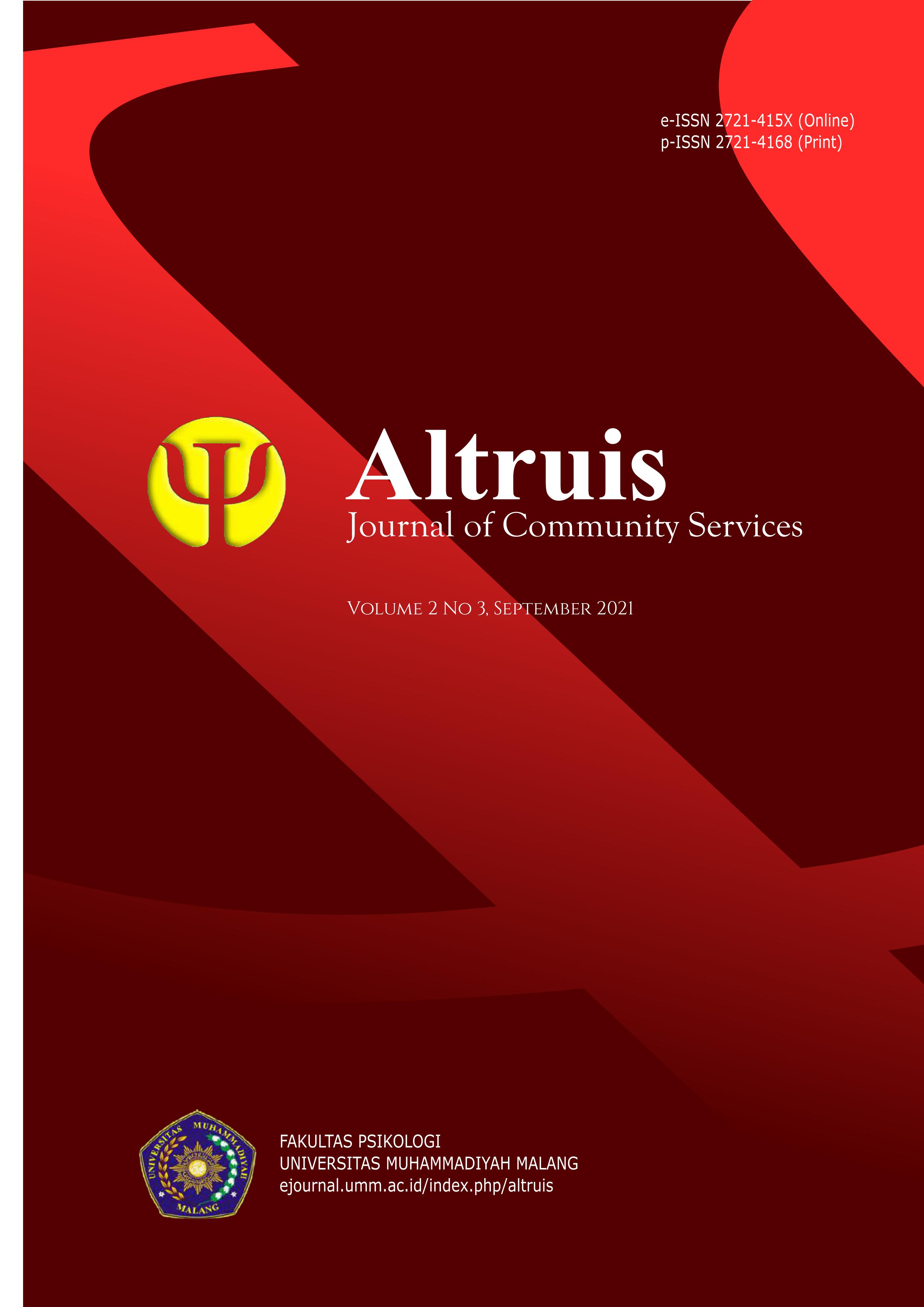Pelatihan Goal setting Untuk Meningkatkan Motivasi Belajar Pada Siswa Di SMP Muhammadiyah 1 Sidoarjo
DOI:
https://doi.org/10.22219/altruis.v2i3.18044Keywords:
motivasi belajar, goal setting, siswaAbstract
Motivasi belajar merupakan seluruh aktivitas daya penggerak pada diri siswa yang menimbulkan aktivitas belajar dan menjamin kelangsungan kegiatan belajar serta memberikan arahan pada kegiatan belajar. Motivasi belajar menjadi daya penggerak yang dapat mengarahkan siswa untuk mencapai tujuan atau sasaran yang ditetapkan. Salah satu faktor yang mempengaruhi motivasi belajar adalah tujuan (goal setting). pembuatan tujuan menjadi suatu upaya penting dalam memaksimalkan motivasi , adanya pemahaman tentang tujuan sebagai suatu untuk digapai dapat menimbulkan minat yang lebih untuk belajar. Psikoedukasi yang dilakukan mendapatkan hasil bahwa terdapat perbedaan motivasi belajar antara sebelum dan setelah diberikan psikoedukais terkait goal setting dengan perbedaan reratanya adalah -16.000 (mean difference), t score = -8.263 dan p = 0.001 < 0.05. Berdasarkan perhitungan deskriptif didapatkan hasil bahwa nilai mean pretest sebesar 99.433 dan posttest sebesar 115.433 yang berarti bahwa motivasi belajar siswa memiliki nilai lebih tinggi setelah mendapatkan psikoedukasi terkait goal setting.
KATA KUNCI: Motivasi belajar, Goal setting, Siswa
Downloads
References
Aina, M. (2013). Efektifitas Pemanfaatan Multimedia Interaktif Pembelajaran Ipa-Biologi Dalam Meningkatkan Motivasi Belajar Siswa Pria Dan Wanita Smp 19 Kota Jambi. Prosiding SEMIRATA 2013, 1(1). p. 125-130
Cahyani, A., Listiana, I. D., & Larasati, S. P. (2020). Motivasi belajar siswa SMA pada pembelajaran daring di masa pandemi covid-19. IQ (Ilmu Al-qur’an): Jurnal Pendidikan Islam , 123-140.
Clarke, S. P., Crowe, T. P., Oades, L. G., & Deane, F. P. (2009). Do goal-setting interventions improve the quality of goals in mental health services?. Psychiatric rehabilitation journal, 32(4), 292.
Fitriyani, Y., Fauzi, I., & Sari, M. Z. (2020). Motivasi belajar mahasiswa pada pembelajaran daring selama pandemik covid-19. Jurnal Kependidikan: Jurnal Hasil Penelitian dan Kajian Kepustakaan di Bidang Pendidikan, Pengajaran dan Pembelajaran, 6(2), 165-175.
Haslam, S. A., Wegge, J., & Postmes, T. (2009). Are we on a learning curve or a treadmill? The benefits of participative group goal setting become apparent as tasks become increasingly challenging over time. European Journal of Social Psychology, 39(3), 430-446.
Locke, E. A., & Latham, G. P. (2002). Building a practically useful theory of goal setting and task motivation: A 35-year odyssey. American Psychologist, 57, 705-717.
Lutfianawati, D., Nugraha, R. S. P., & Syifaâ, R. (2013). Pengaruh pelatihan goal setting terhadap motivasi belajar bahasa Inggris siswa. JIP (Jurnal Intervensi Psikologi), 5(2), 275-288.
Morisano, D., Hirsh, J. B., Peterson, J. B., Pihl, R. O., & Shore, B. M. (2010). Setting, elaborating, and reflecting on personal goals improves academic performance. Journal of applied psychology, 95(2), 255
Downloads
Published
How to Cite
Issue
Section
License
Copyright (c) 2021 Ika Wulan Ramadhani, Zaki Nur Fahmawati, Ghozali Rusyid Affandi

This work is licensed under a Creative Commons Attribution-ShareAlike 4.0 International License.
Authors who publish in Altruis agree to the following terms:
- For all articles published in Altruis, copyright is retained by the authors. Authors give permission to the publisher to announce the work with conditions. When the manuscript is accepted for publication, the authors agree to automatic transfer of the publishing right to the publisher.
- Authors retain copyright and grant the journal right of first publication with the work simultaneously licensed under a Creative Commons Attribution-ShareAlike 4.0 International License that allows others to share the work with an acknowledgment of the work's authorship and initial publication in this journal.
- Authors are able to enter into separate, additional contractual arrangements for the non-exclusive distribution of the journal's published version of the work (e.g., post it to an institutional repository or publish it in a book), with an acknowledgment of its initial publication in this journal.
- Authors are permitted and encouraged to post their work online (e.g., in institutional repositories or on their website) prior to and during the submission process, as it can lead to productive exchanges, as well as earlier and greater citation of published work (See The Effect of Open Access).
This work is licensed under a Creative Commons Attribution-ShareAlike 4.0 International License.


